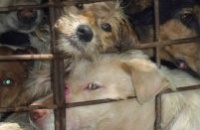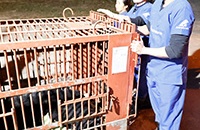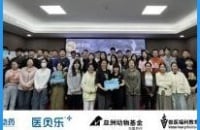The secrets in the hearts of China's rescued moon bears
21 January 2014
The hearts beating inside stoic moon bears, previously caged by China’s bear bile industry, have been put under scrutiny by veterinary cardiologists from the University of Liverpool.
Hannah Stephenson and Chris Linney both travelled from Merseyside to Animals Asia’s China Bear Rescue Centre near Chengdu, to work with sanctuary vets charged with treating the bears that the organisation rescued from the bear bile industry.
They both spent ten days on site performing echocardiograms, ECGs and overall cardiac evaluations. During their visit, the team was able to examine 29 moon bears and take an in-depth look at the heart problems they face.
Animals Asia's China Bear and Vet Team Director Nic Field said:
“We currently have a growing number of bears rescued from bile farms with radiographic evidence of abnormal heart size or shape, suspected aortic aneurysms as well as bears with clinical signs consistent with hypertension.
“One of the primary aims of this visit was for cardiology specialists to assist in confirming suspected diagnoses, determining causes of the development of disease, reviewing our current management of these cases and advising on additional appropriate treatment to improve their long-term health, welfare and quality of life.”
The bears at Animals Asia’s sanctuary had previously spent up to 30 years constrained in tiny cages while suffering daily bile extractions. As a result, following their rescue, Animals Asia vets assist in rehabilitating each bear by providing ongoing treatment and medication to ensure they maintain a good quality of life.
Resident Veterinarian Mandala Hunter-Ishikawa added:
“We have been tremendously fortunate to recently obtain a new, high quality ultrasound unit with a cardiac probe that allows us to better visualise the heart and valves, assess chamber size, valve integrity, and assess cardiac function. The visiting cardiologists were able to thoroughly evaluate bears of concern and train our on-site veterinary surgeons on how to obtain high quality images, accurate measurements and assess cardiac function with the use of echocardiography. “This will also allow us to compile a database of normal images and measurement ranges to compare cardiac cases for future reference, and also to more appropriately manage current and future cardiac cases.”
Chris and Hannah were also able to offer advice to the team on appropriate management and medication for cardiac cases. The collaboration with Chris and Hannah will continue, as there is more work to be done to analyse data and determine the reasons behind the heart issues.
The pair were also able to share their knowledge and provide training to local vets who have worked with Animals Asia in the past.
Chris said:
“We were extremely fortunate to visit and work with Animals Asia's rescue centre providing full assessment of some of the resident moon bears for heart disease. Our assessments identified a number of heart abnormalities for which there are treatments which we hope will give them a better quality of life to enjoy during their years at the sanctuary. A large number of the bears we assessed had significant heart disease including dilated hearts, dilated great vessels and high blood pressure, and we have worked hard with the resident vets to provide the necessary care and medications to help treat these serious conditions.
“We were overwhelmed with the high level of care given to the bears by the vets and bear workers at the sanctuary and were honoured to join the team. The moon bears have been through a difficult time and it was evident that they were so relaxed and at peace in the sanctuary. There still remains a lot of work to be done regarding their heart disease and we hope to continue our collaboration and team work with Animals Asia to help more moon bears.”
Animals Asia would like to extend its special thanks and gratitude to Chis and Hannah for taking the time to share their experience and knowledge with our team. Their contribution has been invaluable and we are much looking forward to future collaborations. We would also like to thank former resident vet, Joanna Reynard for initiating this visit.

BACK





 5 reasons the dog meat trade must end
5 reasons the dog meat trade must end
 New year, new home for Christmas the Bear!
New year, new home for Christmas the Bear!
 Veterinary welfare training – pain management
Veterinary welfare training – pain management